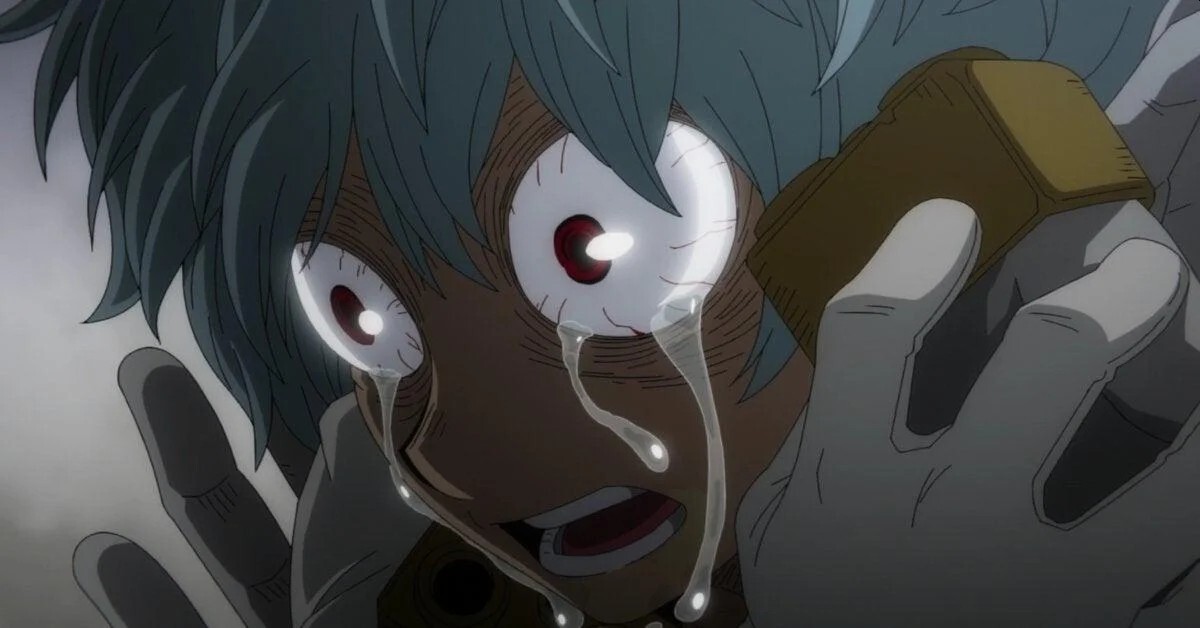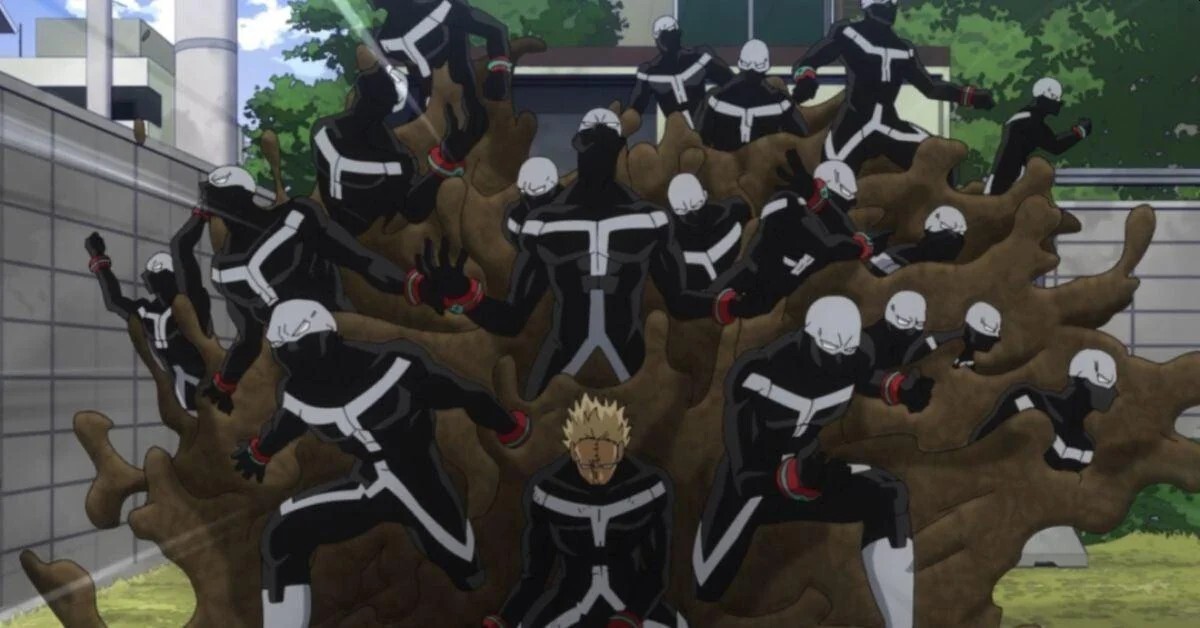Superhero Anime My Hero Academia Is More Like The Boys Than Shonen Anime, Cape Comics
What began as the story of a wide-eyed superhero fan living his dream come true is now an examination of the role of superheroes in society.
My Hero Academia is a shonen anime--meaning that the show is aimed at boys right around their teen years. By most standards, it would be filed alongside shows like Dragonball Z and Naruto. 130 episodes in, though, it's clear now that this show is less like a shonen anime or the typical cape comics that helped to inspire it, and more like Prime Video's ultra-mature, ultra-violent superhero-deconstruction series The Boys. Not because it’s trying to be transgressive and gritty, but because it’s trying to get us to think a little more deeply about the implications of superherodom for the world.
My Hero Academia is set in a world where most of the population has developed what the show calls "Quirks," or genetic evolutions that essentially act as superpowers. We come in nearly two centuries after this phenomenon first began, during a time when superheroes are as commonplace as police officers. However, while heroes might be venerated now, the show often hints at a time when quirks were less accepted.

The show follows a young high school student named Izuku Midoriya (hero name Deku), a superhero nerd who wants more than anything to follow in the footsteps of the world's greatest hero, All Might. There's just one problem: Midoriya is one of the 20% of people who were born without a quirk. The series begins as a wish-fulfillment show, as Deku inherits a superpower from All-Might and has to learn how to use it as he attends a school for aspiring superheroes, U.A. Hero Academy.
The show progresses and Deku struggles with controlling a power his body hasn't been conditioned to handle. And as he becomes more powerful, he faces increasingly harrowing experiences that threaten his personal safety, the well-being of his friends, and the stability of society as a whole. This is when the lens through which My Hero Academia's story is told begins to pull out and question the role of heroes in society.

Around episode 100, a major event begins that pits a massive force of heroes against a villain conspiracy that is designed to discredit and destroy the "society of superheroes." The event includes the deaths of a number of heroes and villains, but also the destruction of multiple cities thanks in part to a powerful villain who can disintegrate anything he touches. While the heroes manage to stop the villains from achieving their full plan, the damage is considerable, with cities demolished and the faith in heroes undermined. The villains exposed the weaknesses of Japan's many heroes on the national stage and also brings some of the less-than-moral subterfuge the heroes engaged in to discover the villains' plans to light too.
What follows is chaos as society is forced to reckon with the destruction heroes cause as well as their moral ambiguity and authoritative role in society. To make matters worse, countless superpowered criminals then escape the offshore superhuman jail (not unlike The Raft in Marvel's stories), causing ordinary citizens to feel the need to defend themselves with increasingly destructive results. In the meantime, superhero after superhero announces their retirement from active duty.
The heroes that are left are then put in the difficult place of trying to figure out what it means to be a hero both to themselves and to society. Those that are still willing to step up are on the receiving end of bottles and bricks or resigned to working in the shadows to protect people that loathe them. All the while, the villains they only just barely stopped are already working on even more destructive plans.
In Prime Video's The Boys, the heroes are far fewer in number, but are every bit as revered. The Boys, however, starts from a more cynical place than My Hero Academia. After main character Hughie's girlfriend is killed by a reckless superhero, he seeks to expose the violent nature of their unchecked power only to find their corruption runs much deeper than he thought. He then joins up with the titular boys to put an end to the injustice in the hero system.
Both shows are deeply interested in the idea of superheroes and their role in modern society, not just as protectors but as wielders of power and as wildly destructive forces of nature. Both shows turn an unflinching eye towards the destruction that corrupt or careless heroes can impart to the world around them, all while performing their role of "hero."

In the later part of Season 5 and into the currently-ongoing Season 6 of My Hero Academia, the show steps away from Deku's story to give us some background on its main villain: Shigaraki Tomura. As a boy, he's raised by an abusive father who despises heroes after feeling abandoned by his superhero mother. However, this does not stop Shigaraki from longing to be an upstanding, caped crusader himself. Unfortunately, when the boy's Quirk manifests, his powers are horrifically destructive; he accidentally disintegrates the family dog, his beloved sister, and his parents, screaming an increasingly soul-rending scream the whole time--it's hard not to be sympathetic for a character we've seen only as an unrepentant killer thus far.
Another villain, Twice, can replicate himself indefinitely, and pledges his loyalty to Shigaraki. However, while he spends his time with villains, his intentions feel heroic; his primary drive is to find friends that he can feel safe alongside, and then protect them. In season five, however, a hero kills him to keep him from overrunning society. Through both Shigaraki's childhood and Twice's death, My Hero Academia forces audiences to confront the idea that good and evil are not quite black and white.

The Boys' A-Train, meanwhile, is a speedster and member of the Seven, that world's version of the Justice League or Avengers. From Hughie's perspective, A-Train is nothing more than a corrupt killer, but as his heart begins to fail him as a result of performance-enhancing drugs, we begin to see how the world has failed him. He'll do almost anything to stay in the Seven because he feels like nothing without them. Even when he knows that what they're doing is wrong, he sides with them out of fear. Then, a hero who sees himself as a sort of superpowered beat cop begins attacking black people that he suspects of criminal activity, regardless of evidence. Though A-Train longs to call him out for his behavior, he is forced by his PR people to disregard his blatant racism, even as it digs into his ideas and his soul. Things finally culminate in a horrifying sequence where A-Train grabs the D-tier hero and drags him on the pavement at superspeed, shredding him alive at the cost of his own career and life.
Though The Boys starts from that idea that heroes are inherently violent and dangerous and My Hero Academia starts from the point of view of a wide-eyed hero fan getting his wish to have superpowers fulfilled, both of these series push deeper and deeper into questions about the value of heroes and the results of their collateral damage and the way that affects people.
Got a news tip or want to contact us directly? Email news@gamespot.com
Join the conversation